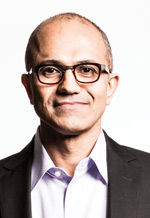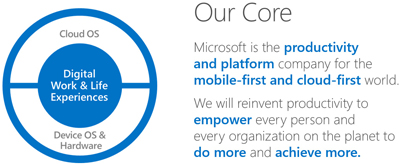Nadella Demotes 'Devices' in Microsoft Vision Statement
Microsoft CEO Satya Nadella issued a massive public memo this morning outlining a refined vision for the company he took over five months ago.
The 3,000-plus-word memo, titled "Starting FY15 -- Bold Ambition & Our Core," hones the redefinition of Microsoft started by his predecessor Steve Ballmer, who in an Oct. 9, 2012 letter told shareholders that "we see ourselves -- as a devices and services company."
Nadella's memo communicates the new vision and organizing principle for Microsoft as this: "At our core, Microsoft is the productivity and platform company for the mobile-first and cloud-first world. We will reinvent productivity to empower every person and every organization on the planet to do more and achieve more."
The vision includes Nadella's common refrain since assuming the job that Microsoft is a cloud-first and mobile-first company. But it takes the word "devices," the first word in Ballmer's reframing of the company and one that has confused investors, partners and customers ever since, and removes it from the vision statement entirely.
Nadella called the devices and services company description "helpful in starting our transformation," but said it was time for a new vision statement that expressed what Microsoft can uniquely deliver.
 "Across Microsoft, we will obsess over reinventing productivity and platforms. We will relentlessly focus on and build great digital work and life experiences with specific focus on dual use."
"Across Microsoft, we will obsess over reinventing productivity and platforms. We will relentlessly focus on and build great digital work and life experiences with specific focus on dual use."
Satya Nadella,
CEO,
Microsoft Corp.
He contends that the vision is large, touching nearly 3 billion people with Internet-connected devices, which, although he doesn't say it, includes mostly non-Microsoft devices. He also argues the vision represents a massive growth opportunity because increasing digitization means technology spending will increase as a percentage of GDP.
Nadella called on company employees to think of what Microsoft does best for customers, rather than the specific tools it sells right now, and build on those concepts.
"Microsoft has a unique ability to harmonize the world's devices, apps, docs, data and social networks in digital work and life experiences so that people are at the center and are empowered to do more and achieve more with what is becoming an increasingly scarce commodity -- time!" he wrote. "Productivity for us goes well beyond documents, spreadsheets and slides. We will reinvent productivity for people who are swimming in a growing sea of devices, apps, data and social networks. We will build the solutions that address the productivity needs of groups and entire organizations as well as individuals by putting them at the center of their computing experiences. We will shift the meaning of productivity beyond solely producing something to include empowering people with new insights. We will build tools to be more predictive, personal and helpful. We will enable organizations to move from automated business processes to intelligent business processes."
A key concept in the memo is the "dual user," someone who uses technology for school or work and in their personal lives.
"They strive to get stuff done with technology, demanding new cloud-powered applications, extensively using time and calendar management, advanced expression, collaboration, meeting, search and research services, all with better security and privacy control. Microsoft will push into all corners of the globe to empower every individual as a dual user," Nadella said. "Across Microsoft, we will obsess over reinventing productivity and platforms. We will relentlessly focus on and build great digital work and life experiences with specific focus on dual use."
While demoting first-party devices from the mission statement, Nadella also made it clear that none of them was going away -- not Surface, not Nokia phones and not Xbox.
A graphical depiction included with the memo titled "Our Core," shows "Digital Work & Life Experiences" in the hole of a donut. The top half of the donut reads "Cloud OS" and the bottom half reads "Device OS & Hardware."

Nadella attempted to put Microsoft's billions in hardware investments into the context of the company's overall strategy: "Our first-party devices will light up digital work and life. Surface Pro 3 is a great example -- it is the world's best productivity tablet. In addition, we will build first-party hardware to stimulate more demand for the entire Windows ecosystem. That means at times we'll develop new categories like we did with Surface. It also means we will responsibly make the market for Windows Phone, which is our goal with the Nokia devices and services acquisition."
He acknowledged that Xbox wasn't at Microsoft's core but he called it a business "in which we can have fundamental impact and success" and promised continuing investments.
Moving away from specific devices, Nadella made clear that another type of Microsoft hardware investment would continue apace. "We will continue to grow our datacenter footprint globally," Nadella vowed.
He positioned Microsoft's datacenters as a fundamental asset powering the company's strategy overall, but called them out as especially important for the Cloud OS, itself especially important to Microsoft.
"Our cloud OS represents the largest opportunity given we are working from a position of strength. With Azure, we are one of very few cloud vendors that runs at hyper-scale. The combination of Azure and Windows Server makes us the only company with a public, private and hybrid cloud platform that can power modern business," Nadella said.
What Nadella's memo does, more than anything, is to try to better articulate what Microsoft can be with the pieces that were largely put in place during Ballmer's tenure -- massive investments in datacenter build-outs, Web 2.0 companies, the Nokia phone business and Surface development.
"Devices" may not be the headline word anymore. But at least for now, Microsoft won't be unwinding any acquisitions or selling off business units or datacenters. Nadella will go into the next phase of the technology wars with the company he has.
Related:
Posted by Scott Bekker on July 10, 2014